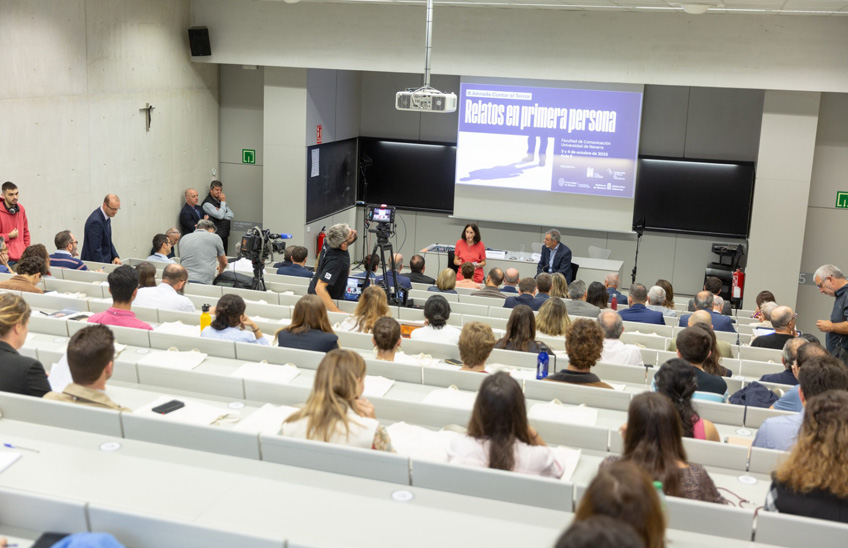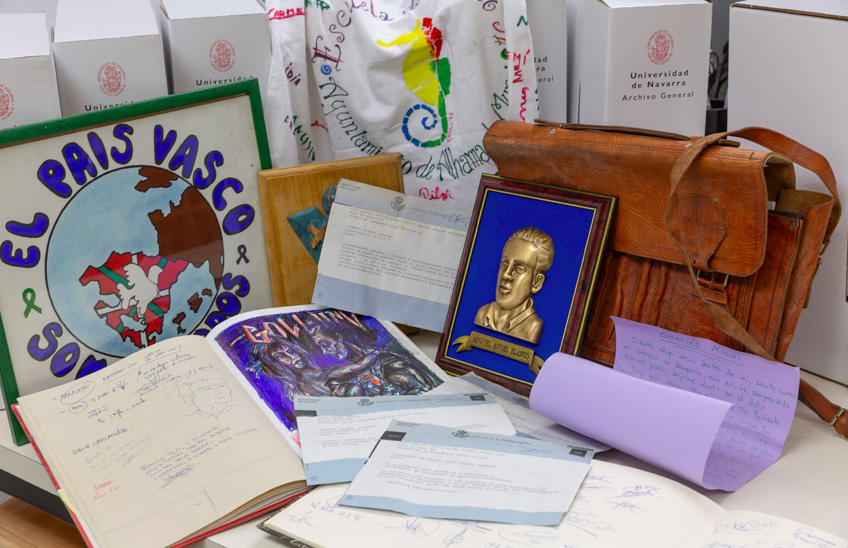First-person narratives as an indispensable element to tell the story of terror
The School de Comunicación hosts the II workshop de Contar el Terror (Telling the Terror)

FotoCedida/CharoSádaba, dean of the School de Comunicación, and Tomás Caballero, president of the Fundación Víctimas del Terrorismo, at the inauguration of the workshop
05 | 10 | 2023
This week was held the II workshop of telling the terror in the School of Communication of the University of Navarra. The workshop, organized by the School, the Victims of Terrorism Foundation and the Memorial Center for Victims of Terrorism, with the support of the Government of Navarra, has focused on first person accounts.
During the two days of workshop , experts in terrorism, academics, journalists, correspondents and victims have visited School . They shared with students and the general public their experiences and perspectives on the importance of listening to victims and including the stories of the perpetrators in the global approach .
Terrorism was approached from different geographic perspectives and also from different rhythms of recounting. Terrorism and guerrillas in Latin America, ISIS, ETA terrorism... from the hand of correspondents, documentary makers and academics.
Getting victims to talk
One of the most recurring themes among the speakers was the role of the journalist in narrating terror and the almost therapeutic role of putting events on paper.
From agreement with Sara Buesa, daughter of the socialist leader assassinated by ETA Fernando Buesa, "sometimes I feel that a lot of pressure is put on the victims and I feel that there are other important agents, such as journalists". A similar idea was introduced by the writer Joseba Eceolaza, when he said that "telling and listening can replace what has happened", since knowledge is "the anteroom of empathy". On the other hand, Buesa affirms that there are different reasons why it is worthwhile to tell the experience of a victim, but the main ones are that in this way one continues to "keep alive their bequest" and that the voice of the victim "has a compassionate power". Jesús J. Hernández, journalist of El Correo, considers that "it is a complicated process for the victim and it is necessary to accompany her in the process".
In addition to the value of the story, the different ways of telling the same experience were also discussed. From agreement with the philosopher specialist in Education and report after Auschwitz Manuel Reyes Mate, this discussion arose the day the concentration camps were liberated, and they were divided between those who believed that everything had to be told "dryly, without adding anything" and those who believed that it was necessary to "resort to the artistic to tell the experience, not the facts". José Manuel Sánchez Riera, who was the only survivor of the attack against the eight agents of the National Intelligence Center in Iraq, affirms that it is essential to respect the limits of the victims: "If the victim's story is not enough, you have to look for other resources", since it is they "who set the limits". Fátima Lianes, director of the series Los ocho de Irak, considers that it is necessary to look for "creative ways" to represent the pain of the victims, as well as other elements such as "not putting distance between the creator and the victim", being able to generate a relationship between "human beings" and sharing "moments and experiences" in a bidirectional way. Before starting a story, Lianes asks himself why and what for, and what sources he can rely on: "The truth has edges when it comes to making a documentary, many versions must be taken into account".
The perpetrators' point of view under scrutiny
Also discussed was the moral discussion involved in interviewing the perpetrators and the benefits this has for constructing a global account of terror. As Reyes Mate explains, "it is impossible to build a new time without counting on them", but at the same time he defends that "their testimonies can only appear in a approach that is dedicated to criticize the general speech of the victimizer". From agreement with the academic Jerónimo Ríos, who has interviewed a large issue of terrorists and members of armed dissidents in Latin America, "interviews with terrorists allow to shed light on that area of dark grays". For Jon Sistiaga, a journalist with experience in places of conflict such as Rwanda, Iraq or Afghanistan, "we should banish the idea of whitewashing someone: if you are lucky enough to have someone 'bad' in front of you, you have the obligation to ask". For him, journalists are "a kind of notary of what is happening". For Pilar Cebrián, Atresmedia's Turkey correspondent with extensive experience in Middle Eastern countries, it is very important for journalists to leave stereotypes aside: "That's why we have to give a voice to the other side. The journalist's duty is to ask the right questions and every journalist is obliged to do that with people who are on the edge". The same idea is contributed by Gaizka Fernández Soldevilla, manager of research of the Victims of Terrorism Memorial Center, when he affirms that "knowing is the best way to avoid a repetition of what happened. That is why we have to interview the terrorist groups".
The last idea collected resides in a conclusion: the construction of a community based on the collective report to prevent political violence from happening again in the future. For Reyes Mate, the report "is not a feeling" but "it is knowledge", "which allows us to know the truth of the facts". For Joseba Eceolaza, "violence not only brutalizes those who exercise it", but "also those who defend it", because he thinks that in addition to the report it is necessary to create a "community of report". Reyes Mate considers that a community must be built based on never again and on the assumption of responsibilities, because if this is not done "we will tend to repeat what has happened".




